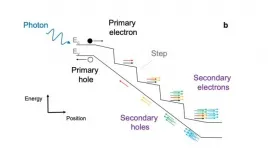(Press-News.org) DALLAS, May 20, 2021 — Adopting healthy lifestyle behaviors can lower dementia risk among people who are at higher risk due to a family history of dementia, according to preliminary research to be presented at the American Heart Association’s Epidemiology, Prevention, Lifestyle & Cardiometabolic Health Conference 2021. The meeting is virtual, May 20-21, and offers the latest science on population-based health and wellness and implications for lifestyle.
Familial dementia is a strong risk factor for dementia. Having a first-degree relative such as a parent or sibling with the disease can increase a person’s risk of dementia by nearly 75% compared to someone who does not have a first-degree relative with the condition. Other common risk factors for dementia include age, sex, race, education, high blood pressure, high cholesterol, Type 2 diabetes and depression.
“When dementia runs in a family both genetics and non-genetic factors, such as dietary patterns, physical activity and smoking status, affect an individual’s overall risk,” said study author Angelique Brellenthin, Ph.D., assistant professor of kinesiology at Iowa State University in Ames, Iowa. “This means there may be opportunities for reducing risk by addressing those non-genetic factors.”
Brellenthin and colleagues analyzed health information on 302,239 men and women, ages 50-73 years, who completed a baseline physical examination between 2006-2010 as part of the UK Biobank Study, which is a large study encompassing over 500,000 people in the United Kingdom. The adults were free of dementia at the beginning of the study and filled out questionnaires about family history and lifestyle. Participants were given one point for each of six healthy lifestyle behaviors they followed, including:
Eating a healthy diet with more fruits and vegetables, and less processed meat and refined grains;
Meeting physical activity guidelines of 150 or more minutes a week of moderate-to- vigorous physical activity;
Sleeping 6 to 9 hours each day;
Drinking alcohol in moderation;
Not smoking; and
Not having obesity, meaning they had a BMI (body mass index) of END
Healthy lifestyle behaviors reduced dementia risk despite family history of dementia
American Heart Association Epidemiology, Prevention, Lifestyle & Cardiometabolic Health Conference -- Presentation 74
2021-05-20
ELSE PRESS RELEASES FROM THIS DATE:
Social isolation and loneliness linked to increased risk of CVD in post-menopausal women
2021-05-20
DALLAS, May 20, 2021 — Social isolation and loneliness were each associated with a higher risk for cardiovascular disease in post-menopausal women, according to preliminary research to be presented at the American Heart Association’s Epidemiology, Prevention, Lifestyle & Cardiometabolic Health Conference 2021. The meeting is virtual, May 20-21 and offers the latest science on population-based health and wellness and implications for lifestyle.
Social isolation is the quantifiable measure of social interactions in relationships. Loneliness is ...
Adult obesity, inactivity associated with violent crime in Black and Hispanic communities
2021-05-20
DALLAS, May 20, 2021 — The prevalence of physical inactivity and obesity in adults were linked to violent crime rates in Chicago’s urban Black and Hispanic communities, according to research to be presented at the American Heart Association’s Epidemiology, Prevention, Lifestyle & Cardiometabolic Health Conference 2021. The meeting is virtual, May 20-21 and offers the latest science on population-based health and wellness and implications for lifestyle.
In the U.S., violence is a major threat to public health in communities with people from diverse racial and ethnic groups in large urban areas. These communities also have disproportionately higher rates of murder, armed robbery, aggravated ...
Gender-affirming hormone therapy may not increase CVD risk for transgender adolescents
2021-05-20
DALLAS, May 20, 2021 — Transgender adolescents are more likely to have at least one cardiovascular disease risk factor compared to cisgender (same gender as at birth) adolescents, according to preliminary research to be presented at the American Heart Association’s Epidemiology, Prevention, Lifestyle & Cardiometabolic Health Conference 2021. The meeting is virtual, May 20-21 and offers the latest science on population-based health and wellness and implications for lifestyle.
The United States has a growing population of transgender adolescents ages 12-21 who seek medical transition gender-affirming hormone therapy. Gender-affirming hormone therapy involves taking estrogen or testosterone ...
Moderate-to-high TV viewing in midlife linked to later cognitive and brain health decline
2021-05-20
DALLAS, May 20, 2021 — Spending moderate to high amounts of time watching television throughout midlife was linked to greater cognitive decline and lower gray matter volumes in the brain later in life, according to preliminary research from three studies (P149, MP24 and MP67) to be presented at the American Heart Association’s Epidemiology, Prevention, Lifestyle & Cardiometabolic Health Conference 2021 (EPI). The meeting is virtual, May 20-21, and offers the latest science on population-based health and wellness and implications for lifestyle.
“While studies have shown the benefits of exercise to support brain health, less is known about the potential consequences of prolonged sedentary behavior such as television viewing ...
2016 US presidential election skewed BP, heart rhythms in those with existing conditions
2021-05-20
DALLAS, May 20, 2021 -- Notable for high levels of stress and anger, the 2016 U.S. presidential campaign and election may have increased the risk of potentially life-threatening heart rhythms and worsened high blood pressure in people with underlying cardiovascular disease who already had a history of these conditions, according to a new study published today in the Journal of the American Heart Association and in a separate preliminary study to be presented at the American Heart Association's Epidemiology, Prevention, Lifestyle & Cardiometabolic Health Conference 2021. The meeting is virtual, May 20-21, and offers the latest science on population-based health and wellness and implications ...
Palaeontology: Ancient turtle from Texas yields evolutionary insights
2021-05-20
The discovery of the oldest known North American species of side-necked turtle -- turtles that withdraw their necks sideways into their shells when threatened -- is reported in Scientific Reports this week. The findings suggest that side-necked turtles may have migrated to North America during the Cenomanian age (100 to 94 million years ago).
Brent Adrian and colleagues have named the species Pleurochayah appalachius from the Greek word Pleuro (side), the Caddo word Cha'yah (turtle) and the North American Appalachian region. The fossilised remains of P. appalachius, which were discovered at the Arlington Archosaur Site of the Woodbine Group in Texas, USA, date back to the lower middle Cenomanian. They predate remains of Paiutemys tibert, a side-necked turtle species from Utah that ...
Overcoming long-term trauma can be facilitated
2021-05-20
How the brain deals with trauma is complex, and it's intuitive to say that we, as humans, get over trauma differently depending on if it happened a long time ago or if it was recent. But what scientific evidence do we have about the way the brain deals with short-term versus long-term traumatic memories?
EPFL scientists have identified the specific regions in the brains of mice responsible for reprograming traumatic experiences towards safety, and the brain regions are indeed different and depend on whether the trauma happened recently or a long time ago. They found that they could facilitate the extinction of long-lasting traumatic memories by enhancing the activity of a primitive region of the brain called the nucleus reuniens. The results are published today in Nature ...
A brand new cocktail to fight HIV
2021-05-20
Montréal, May 20, 2021--Researchers at the University of Montreal Hospital Research Centre (CRCHUM) and Yale University have succeeded in reducing the size of the HIV reservoir in humanized mice by using a "molecular can opener" and a combination of antibodies found in the blood of infected individuals.
In their study published in Cell Host & Microbe, the team of scientists, in collaboration with their colleagues at the University of Pennsylvania and Harvard Medical School, show that they were also able to significantly delay the return of the virus after stopping antiretroviral therapy in this animal model.
Humanized mice are generated from immunodeficient mice that don't have their own ...
Ultra-sensitive light detector gives self-driving tech a jolt
2021-05-20
Realizing the potential of self-driving cars hinges on technology that can quickly sense and react to obstacles and other vehicles in real time. Engineers from The University of Texas at Austin and the University of Virginia created a new first-of-its-kind light detecting device that can more accurately amplify weak signals bouncing off of faraway objects than current technology allows, giving autonomous vehicles a fuller picture of what's happening on the road.
The new device is more sensitive than other light detectors in that it also eliminates inconsistency, or noise, associated with the detection process. Such noise can cause systems to miss signals and put autonomous vehicle passengers at risk.
"Autonomous ...
Radar tracking uncovers mystery of where honeybee drones have sex
2021-05-20
Scientists from Queen Mary University of London and Rothamsted Research have used radar technology to track male honeybees, called drones, and reveal the secrets of their mating behaviours.
The study suggests that male bees swarm together in specific aerial locations to find and attempt to mate with queens. The researchers found that drones also move between different congregation areas during a single flight.
Drones have one main purpose in life, to mate with queens in mid-air. Beekeepers and some scientists have long believed that drones gather in huge numbers of up to 10,000 in locations known as 'drone congregation areas'. Previous research has used pheromone lures to attract drones, raising concerns ...
LAST 30 PRESS RELEASES:
Study reveals insights about brain regions linked to OCD, informing potential treatments
Does ocean saltiness influence El Niño?
2026 Young Investigators: ONR celebrates new talent tackling warfighter challenges
Genetics help explain who gets the ‘telltale tingle’ from music, art and literature
Many Americans misunderstand medical aid in dying laws
Researchers publish landmark infectious disease study in ‘Science’
New NSF award supports innovative role-playing game approach to strengthening research security in academia
Kumar named to ACMA Emerging Leaders Program for 2026
AI language models could transform aquatic environmental risk assessment
New isotope tools reveal hidden pathways reshaping the global nitrogen cycle
Study reveals how antibiotic structure controls removal from water using biochar
Why chronic pain lasts longer in women: Immune cells offer clues
Toxic exposure creates epigenetic disease risk over 20 generations
More time spent on social media linked to steroid use intentions among boys and men
New study suggests a “kick it while it’s down” approach to cancer treatment could improve cure rates
Milken Institute, Ann Theodore Foundation launch new grant to support clinical trial for potential sarcoidosis treatment
New strategies boost effectiveness of CAR-NK therapy against cancer
Study: Adolescent cannabis use linked to doubling risk of psychotic and bipolar disorders
Invisible harms: drug-related deaths spike after hurricanes and tropical storms
Adolescent cannabis use and risk of psychotic, bipolar, depressive, and anxiety disorders
Anxiety, depression, and care barriers in adults with intellectual and developmental disabilities
Study: Anxiety, gloom often accompany intellectual deficits
Massage Therapy Foundation awards $300,000 research grant to the University of Denver
Gastrointestinal toxicity linked to targeted cancer therapies in the United States
Countdown to the Bial Award in Biomedicine 2025
Blood marker from dementia research could help track aging across the animal world
Birds change altitude to survive epic journeys across deserts and seas
Here's why you need a backup for the map on your phone
ACS Central Science | Researchers from Insilico Medicine and Lilly publish foundational vision for fully autonomous “Prompt-to-Drug” pharmaceutical R&D
Increasing the number of coronary interventions in patients with acute myocardial infarction does not appear to reduce death rates
[Press-News.org] Healthy lifestyle behaviors reduced dementia risk despite family history of dementiaAmerican Heart Association Epidemiology, Prevention, Lifestyle & Cardiometabolic Health Conference -- Presentation 74

